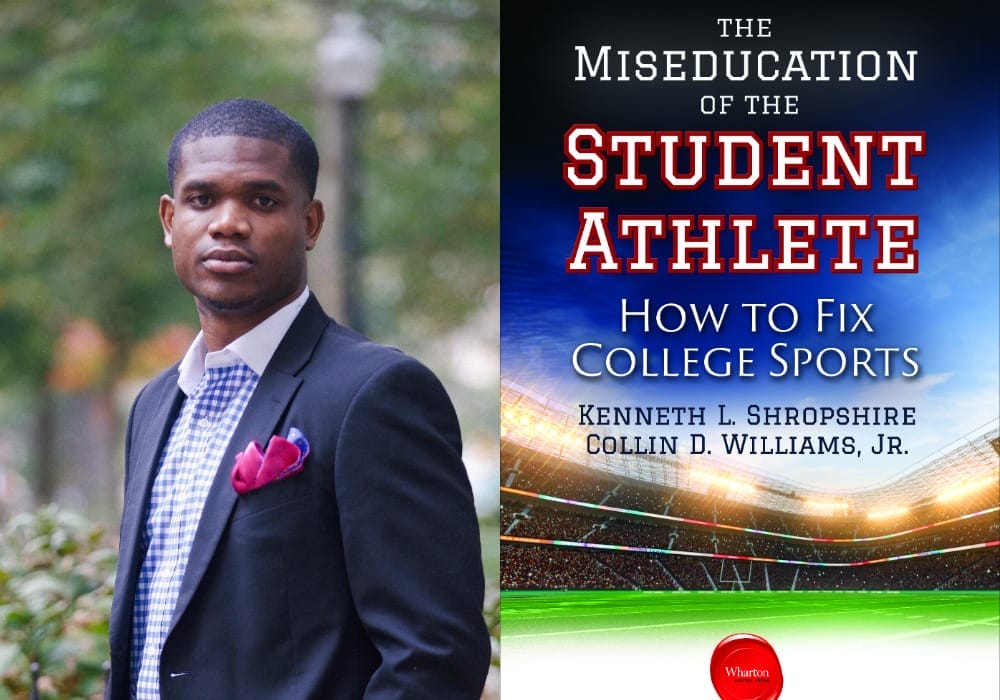In a Q&A with Wharton Digital Press, Collin D. Williams Jr., coauthor of The Miseducation of the Student-Athlete, discusses the importance of reforming college sports to emphasize academics.
Wharton Digital Press: In The Miseducation of the Student Athlete, you and your coauthor, Wharton Professor Emeritus of Legal Studies and Business Ethics Kenneth L. Shropshire, write, “While sport pays for a select few, education pays for most.” Please explain why you see education as the bigger pay-off.
Collin D. Williams, Jr. [Director of Leadership and Education Programs in the South region for the Ross Initiative in Sports for Equality (RISE)]: Though it may come as a surprise given the narratives we see in the media, the truth is Black men have a greater chance of earning the highest degree awarded in a given field than they do of being drafted to the NFL or NBA. The NCAA itself publishes a document showing how unlikely it is for a high school athlete to make it to college and be drafted to the pros. Less than two percent of college athletes will be drafted. Education, on the other hand, has much greater social, emotional, civic, and fiscal benefits over a lifetime. By no means am I implying that one should forego sports to get an education. Rather, if you have the chance to get an education in conjunction with pursing your athletic dreams, take it. With the current time demands set up the way they are, college sports need to be reformed so more student-athletes can actually do so.
WDP: You were not an athlete in college, yet your research explores how undergraduates’ social experiences influence engagement, academic performance, campus climate, and post-college outcomes, especially for students and athletes from low-income, first-generation college and underrepresented minority backgrounds. What did you witness during your collegiate years that led you to this specific area of study?
Williams: As a college sophomore still thinking about going into business, I procured an internship in sponsorship marketing at ESPN. While there I applied for an additional opportunity to work on the Elite 24, a basketball tournament for the best 24 high school basketball players in America who were not yet seniors. A number of interactions, particularly one where one participant asked me how to spell “squad,” led me to see firsthand the disproportionate attention paid to actualizing these young men’s athletic potential as opposed to their academic and other potential. That was when the curiosity was sparked.
As the son of Caribbean immigrants who came here with nothing, I recognized education was my way out. While sports got so many of these low-income, first-generation, and/or kids of color access to education, the focus on being part of the elite group who made it professionally blinded them to the long-term pay-off of investing sufficient time and energy into that college education. Focused on social equity and a self-proclaimed champion of society’s underdogs, I want to make sure people who are a part of these vulnerable populations take advantage of every opportunity given to them. My research is focused on Division I student-athletes because people are more comfortable talking about sports than race, equality, and social justice. Sports, ultimately, was my preferred vehicle for social change.
WDP: Your coauthor Ken played sports while in college and his son played sports in college. What is one of the most important takeaways from reading The Miseducation of the Student Athlete that you want parents of student-athletes to understand in order to better prepare their children for the experience?
Williams: Playing sports, even if you make it professionally, is an experience. It is often not a career lasting more than 5 years. There’s no better way to prepare for life after sports than to make full use of the other opportunities and networks you have access to in college.
WDP: With the book, you address previous attempts at student-athlete compensation reform, including the one-sided Ivy and professional models, and explain why they haven’t gained much traction. You propose the Meaningful Degree Model as an alternative. Please explain.
Williams: The Meaningful Degree Model takes the stance that simply procuring a college degree is not enough. We accept that sports, for a host of sociocultural reasons, will come first in an athlete’s life, and we created a model that frames education around this obstacle. We want scholarship athletes to get the best educations possible, and we know that cannot be done in the current college sports climate. The Meaningful Degree Model removes the academic shot clock so that student-athletes can learn at the pace best suited for them.
WDP: In your book, you introduce the Student Athlete Manifesto. One of the goals of the manifesto is to make obtaining a meaningful degree the priority—not football, basketball, or any sport. What are some of the suggestions proposed in order to manifest this achievement for the majority of student-athletes?
Williams: Honestly, that’s a personal choice and decision. Most Power 5 athletes aren’t getting athletic scholarships without prioritizing sports—at first. Our major recommendation is reforming the system so athletic development isn’t in direct competition with academic development. Thus we want to [achieve the following]: Broaden the pathway to meaningful degree completion by granting athletes the right to return to complete their degree; mandate academic bootcamps for entering student-athletes and professional bootcamps for exiting student-athletes; make maximum use of summers for educational and professional development; and provide personalized counseling on the best paths among academic and career options.
Editor’s note: This post was originally published by Wharton Digital Press. View the original post here. For more information on The Miseducation of the Student Athlete or to purchase a copy, visit the Wharton Digital Press website.

























